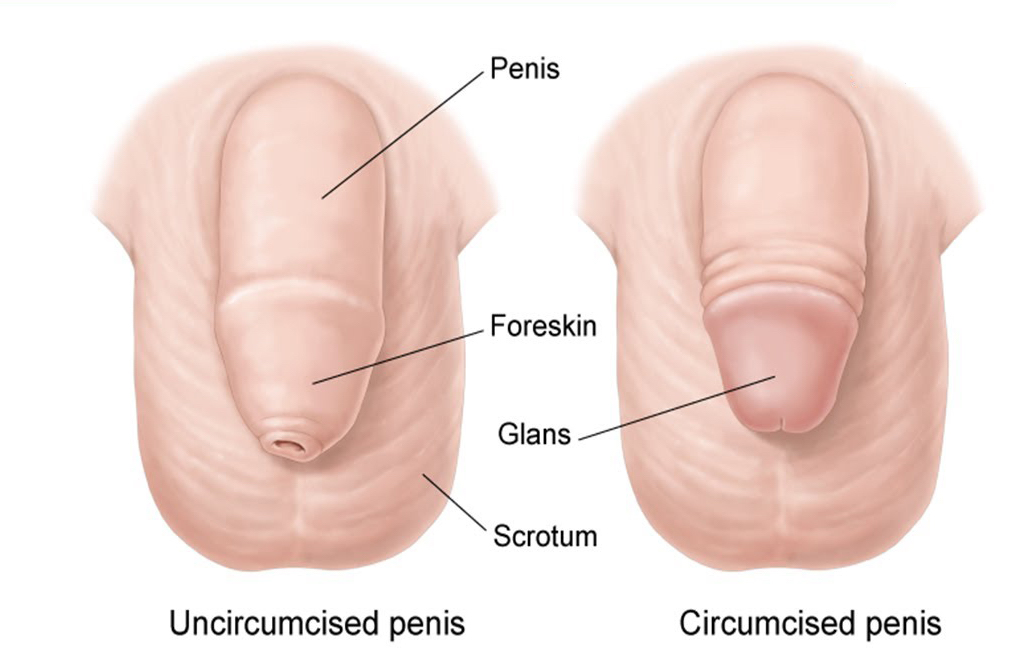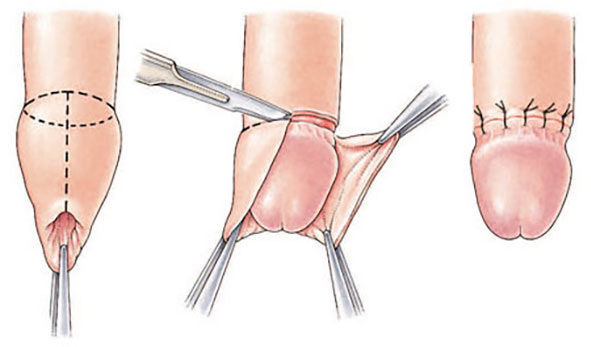Circumcision is one of the oldest operations known.
Even today, it plays an integral part in the practices of many cultures and religions. From a medical perspective, there are instances when circumcision is required. It is a minor procedure performed as day-case surgery (ie no overnight stay in hospital required). Circumcision has no detrimental effect on a man’s libido (sex drive), his sexual ability, fertility or the quality of erections.
It really is up to you. I do circumcisions under local anaesthesia in the clinic and also under general anaesthesia in the operating room.
When you have the circumcision done in the clinic, I will inject the local anaesthetic just below the skin at the base of the penis. I use a small needle but you will feel a slight pinch. The remainder of the procedure should be totally painless.
Benefits of local anaesthesia circumcision are:
- Significantly reduced costs compared to circumcision under general anaesthesia.
- You can drive yourself to- and from the clinic on the day of your procedure (though I do recommend a support person to accompany you).
- No need to recover from the anaesthetic (drowsiness, nausea etc.)
That being said, for some men the prospect of injections anywhere close to the penis is scary! – General anaesthetic, in other words being asleep in an operating theatre, is an excellent option.
- When phimosis is present – This is the inability to retract the foreskin of the penis in order to expose the head of the penis / glans. Phimosis is normal in babies and boys up to the age of 5 years and in this age group, the foreskin should never be forced back.
- When paraphimosis occurs – This is a very painful condition that develops when a tight foreskin is forcefully retracted.
- Recurrent infection of the head of the penis or the foreskin (called balanitis or balano-posthitis). This is common in men who suffer from diabetes.
- Men with cancer of the penis.
- Warts on the penis.
- Trauma to the foreskin (usually caused by a zipper)
- In babies born prematurely.
- In patients with severe illness.
- In people with bleeding tendency (eg haemophilia).
- In babies born with an abnormal-looking penis: Either a skew or rotated penis or abnormally placed urethra. The urethra is the small opening usually located on the tip of the penis where urine comes out. Some baby boys are born with this opening not at the tip of the penis, but somewhere along the underside of the penis – this condition is called hypospadias.
- It prevents the development of penis cancer: Men who had circumcision as a baby will almost never develop cancer of the penis.
- It protects against HIV: Circumcision reduces the rate of HIV transmission by 50-70%.
- It may prevent urinary tract infections in baby boys under the age of 6 months.
There are many techniques for performing circumcision.
Excision using a surgical scalpel (also called the “double sleeve” technique) is safe and reliable, with a low complication rate and excellent cosmetic results. Other techniques for performing circumcision include clamps and shields, which are made of plastic or metal. Although these devices can be applied by nurses or other healthcare providers, it is preferable that a circumcision always be performed by a qualified doctor.
What to expect on the day of surgery
I use the double-sleeve method when performing circumcision. It can be done under general anaesthesia in the operating room and also under local anaesthesia in the clinic, which is much less costly. The foreskin is surgically removed and small bleeding vessels are closed off with a stitch / suture or electric current. A fine suture is then used to close the skin incision just below the glans penis, followed by the application of a small bandage or other type of dressing.
Circumcision is a quick and simple procedure and you will not be required to spend a night in hospital.
After the operation, you will receive detailed instructions regarding wound care. Be sure to follow these carefully in order to minimize discomfort and prevent complications. Little ones should be kept still (not always easy I know!) and not be running around for the first day or two.
The skin sutures will dissolve on their own usually within 2-4 weeks. Mild pain is normal in the first few days after the operation – standard pain medication such as Panadol and anti-inflammatories (Ibuprofen) will be sufficient to relieve pain.
Risks and complications
Circumcision is a minor operation with a low complication rate. In the rare event that complications do occur, they are mostly not serious and can be managed with simple measures. Possible complications include:
- Bleeding
- Infection
- Ulceration of the urethral opening
- Damage to the glans of the penis
- Damage to the shaft of the penis
- Inability to pass urine after the operation (this is uncommon and will usually resolve within a few hours)


